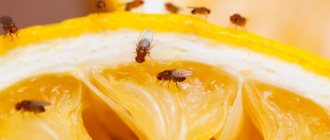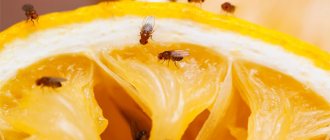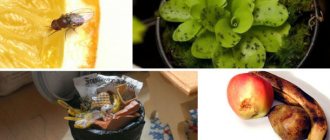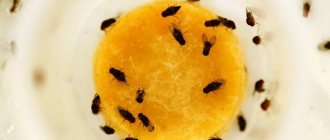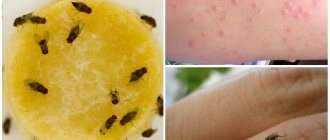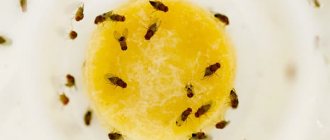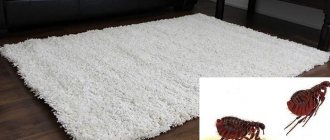But the answer to this question lies on the surface. And you just have to think a little and use your imagination, and it will immediately become clear where the midges on fruit come from. But we will not look for simple ways, but will approach the issue responsibly, revealing along the way all the secrets of the enemy insect invasion. To begin with, let us remind our readers of the picture of what is happening in the apartment in the event of infection.
What are midges like in a house or apartment?
Fruit midges are very small dipterous insects, the length of which does not exceed 2-3 mm. In total, there are more than 1000 species; in our country alone there are 40 of them. We will not delve into the specific features of the species, since they all annoy us in the same way. Drosophila are extremely prolific insects. The female lays up to 120 eggs in one clutch. Thus, over the entire life cycle, it can produce from 600 to 2000 individuals of its species. Due to active reproduction and the rapid transformation of eggs into adults, it is not so easy to fight fruit flies.
Eggs laid on the surface of food can remain dormant until favorable conditions for development are created. For example, as soon as a fruit infected with Drosophila eggs begins to rot, the eggs will quickly turn into larvae, pupate and adults will appear. The female Drosophila is ready to reproduce already 8 hours after birth.
The flying apparatus of fruit flies does not allow them to travel significant distances. A midge can cover no more than 180 meters per day. Therefore, they simply cannot fly from somewhere; the reason for their appearance must be looked for nearby. In general, fruit flies are practically never found in the wild; they settle mainly near humans. And no wonder, there is always something to enjoy here.
Drosophila love moist and shaded places and are especially active at sunrise and sunset. In hot weather they prefer to stay in shelter.
Surprisingly, there are cases where fruit flies are specially bred. This applies to those who are involved in breeding and keeping ants. Drosophila are an excellent food for them. But we won’t have an anthill in the house, so we’ll have to get rid of the midges in the apartment and find out the reason for the appearance..
Where do midges come from in the kitchen?
There are several reasons why midges appear:
- rotting of plant matter - the fermentation process and the unpleasant odor that accompanies it, attracts insects, and midges lay eggs on the remains of food;
- wet dirty rags and dishwashing sponges, a dirty sink create a good environment for the rapid reproduction of insects;
- a dirty trash can from which garbage is not thrown out in a timely manner;
- flower pots, if tea leaves are added to them, which begins to rot when watered;
- midges can enter the apartment through ventilation holes and pipes.
Reproduction of midges
At a room temperature of 25 degrees, the life cycle of these insects will be 10 days. If the constant temperature is within 18 degrees, then life expectancy increases to 1 month.
The reproduction of food midges occurs according to the following scenario:
What to do if your kitchen sink is clogged: how to clear the clog yourselfInstalling a siphon under a kitchen sink with your own hands: assembly and connection diagram
How to wash a suspended ceiling so it looks like new
- The female lays about 400 eggs in the water, and within 24 hours they hatch into larvae. Over the course of 5 days, the larvae grow, and at 24 and 48 hours after birth they begin the process of molting, after which they crawl to the surface of the water and, when dry, become covered with a shell. After five days, the larvae turn into adults - adults.
Throughout their lives, females are fertilized only once, and after mating they will lay eggs constantly. The sperm will remain inside the female all this time.
How dangerous are midges for humans?
Countless numbers of these tiny creatures move around the home at high speed. They are found either next to the trash can or next to indoor plants. If you leave a few grapes on the table, they will immediately appear above them. Many owners practice storing fruits and berries on the table, in fruit vases, which naturally attracts fruit flies, as the fruit quickly begins to deteriorate. At the same time, it is not difficult to imagine what they could leave on food if their route of movement intersected with a trash can, bathroom or toilet. The result of their vigorous vital activity may be contamination of fruits and other food products with various fungal or infectious diseases.
There is only one conclusion: it is necessary to take all measures to ensure that these little parasites no longer exist in the apartment. If you don’t fight them, they will multiply to such an extent that it will be very difficult to fight them. Despite this, the matter will have to be brought to its logical conclusion. Who would like to see swarms of insects moving around the kitchen or throughout the apartment? They won’t even let you eat in peace!
Drosophila in indoor plants
Quite often, fruit flies hover around flower pots; they are attracted to rotting leaves and damp soil. Sometimes the cause of the spread of midges is soil contaminated in the store; if there is such doubt, the soil must be kept in the oven before use.
It is not recommended to overwater the plant; fallen flowers and leaves should be thrown away. A match, which must be stuck into the soil with the painted end, will also help reduce the number of insects. If midges are found in a flower pot, it is also recommended to water the plant with an insecticide that is harmless to it; the action of the drug is aimed primarily at destroying midges and their larvae.
Dichlorvos is considered the most extreme measure to get rid of midges; it is not recommended to be in the room during the disinfection period.
Where do they come from in winter?
First of all, it must be said that they cannot tolerate cold, much less frost; contact with low temperatures will immediately lead to death. In addition, if other insects can survive the winter due to diapause, when they hibernate and all processes stop, and resume with the arrival of warmth, then midges do not have this ability. Therefore, for a person, the appearance of these insects in an apartment in winter causes bewilderment.
But in fact, everything is quite simple and there is no science fiction in their appearance in winter. The fact is that in winter they are also active, but they do not live on the street, as in summer, but in rooms where food supplies are stored, for example, in warehouses.
There, females lay eggs on fruits and vegetables, which end up on the shelves of markets, shops, and then in living quarters. Just like in the summer, they can get into the apartment from neighbors through the ventilation holes. They can also fly in from basements, especially trees that store food and where cleanliness is not maintained.
What is the harm of a fruit fly and is there any benefit from it?
Drosophila do not bite, do not suck blood, and do not transmit diseases.
In general - harmless. But, hovering in a swarm over a rotting fruit or houseplant, they flicker before your eyes and create special discomfort. The harm from flies is one thing: if you eat spoiled fruit infected with larvae, you can get intestinal upset.
Fruit flies are so small that they would go unnoticed by humans if not for their intrusive lifestyle. You can also understand that they have really started up in the apartment when spoilage or areas of rotting appear on fruits and vegetables. If the food begins to rot, then the female insect has probably laid eggs in it or larvae have already appeared.
How to get rid of midges?
Step 1. Finding a source of food and reproduction
To completely get rid of kitchen midges, you need not just to destroy them, but to identify their source of origin.
They may be:
- Overripe berries, fruits and vegetables that have begun to rot. Insects lay their eggs on such fruits, which, after entering favorable conditions for them, begin to actively develop. Thus, entire colonies of midges appear in the apartment. At the same time, the storage location of such a source - on the table or in the refrigerator - is absolutely not important.
- Garbage container or garbage located in hard-to-reach places that are usually not touched by the cleaning process. An apple core lying there attracts the attention of pests more than dirty dishes.
- Sink drain. After cleaning the sink until it shines, many people feel that they have done this part of cleaning perfectly. However, they do not suspect that the depth of the drain is a repository of all kinds of waste. If you do not use pipe cleaners for a long time, rot will form inside, which is an ideal breeding ground for insects.
- Unclean neighbors. Different people live in an apartment building: some keep their home perfectly clean, others do exactly the opposite. Therefore, even one such apartment can “provide” the entire entrance with harmful insects spreading through the ventilation hatches.
- The soil in which indoor flowers grow. Small earth bugs easily settle and reproduce in flower pots, since high humidity creates favorable conditions for them to do so.
Having established the cause of midges, you can easily get rid of them in a matter of days.
First of all, for this it is necessary to eliminate the source itself; for this you need to perform a number of actions:
- Carefully sort through your vegetable supplies and throw away or recycle damaged ones. In the future, this procedure should be regular.
- Ensure that bulk products are stored in hermetically sealed containers that do not allow moisture to penetrate. When pouring cereals, you need to carefully check them for the presence of midges and larvae.
- Place all perishable foods in the refrigerator. Do not put too much fruit in the vase, but fill it as it becomes empty.
- Thoroughly wash and dry the bread bin.
- If there are plants in the apartment, systematically remove fallen leaves, loosen the soil in the pots, wipe them outside and wash the trays using cleaning products. If midges are found in the soil, replace the composition with a new one, and treat the leaf blades of the plants with a weak solution of potassium permanganate.
- Take out the trash and rinse the bin several times with a strong disinfectant.
- If pets live in an apartment, change the water in the drinking bowl daily and store leftover food in a container specially designated for this purpose.
- Clean the refrigerator - remove stale food residues from it, remove smudges.
- Get into hard-to-reach places in the room and wash them, throw away certain items from there.
- Treat drain pipes with chemicals. You can also use a mixture of baking soda and vinegar for this purpose.
- Wash the stove thoroughly, especially its side walls and oven.
- Check the condition of the microwave oven and, if necessary, remove grease from its surface.
Step 2. Destruction of midges
If all possible sources of midges have been found and eliminated, but pests are still present in the apartment, it is necessary to begin eliminating them. There are many ways to get rid of kitchen insects.
A physical way to eliminate midges in the kitchen
The first thing you need to do is create a strong draft in the room - some of the midges will fly out into the street. Places where insects are most concentrated can be “treated” with a vacuum cleaner. The main thing is not to forget to take the bag or container outside after this and shake it out thoroughly.
You can put the rotten fruit you find in the sink, and after a swarm descends on it, simply turn on the water. Most large individuals will be washed into the sewer, from where they will no longer be able to get out.
Smoking
The crushed hard camphor is placed in an old frying pan (one that you don’t mind throwing away) and put on fire. As soon as the frying pan is hot and steam starts to flow, the container is carried throughout all rooms of the apartment. The resulting smoke is not dangerous for humans, but midges will not tolerate it.
Vacuum cleaner
Killing midges with a vacuum cleaner will help get rid of an entire colony. To do this, you need to treat all surfaces in the apartment with this technique. To remove as many insects as possible from hidden places, it is recommended to first leave them some kind of bait.
Once the midges are in the container, you need to shake it out outside the apartment, otherwise the dust collector will become an additional source of their habitat.
It should be noted that this method is not very effective, since it involves eliminating only those pests whose location has been discovered. Usually, after such a procedure, new colonies appear after some time.
Poison for midges
A couple of recipes for poisonous treats for insects:
- ½ cup of milk is mixed with 40 g of sugar and the same amount of ground black pepper. Soak a paper napkin or a piece of toilet paper in the liquid and place it on a plate next to the midges. After a while there will be no insects left.
- 10 g of honey is combined with 1 g of saccharin, and a napkin is moistened with this mixture. Place it on the windowsill.
Glass bottle trap
To make such a device you will need a bottle or a tall narrow jar. Sweet bait is placed at the bottom. This could be fruit that has begun to rot, a spoonful of jam, honey, sweet syrup, apple cider vinegar, or leftover wine. Then roll a piece of paper into a funnel, leaving a small hole in the narrow part, and secure it with tape to maintain its shape. The resulting cone is inserted into the jar, with the narrow part down so that it does not touch the bait.
The resulting trap is installed overnight in a place where a significant part of the insects accumulate. Attracted by the sweet smell, they climb inside the trap, but are no longer able to get out.
The next day, without removing the funnel, pour hot water mixed with liquid soap into the jar. After a few minutes, all the insects collected inside the trap will die. Then you can open the jar and throw away the contents. It is better to open the trap outside. Then the remaining living individuals will not be able to get back into the house.
Bowl trap
Here use a large or medium bowl. A sweet liquid is poured onto the bottom and pieces of rotten fruit or other suitable bait are laid out. Cover the bowl tightly with cling film on all sides so that there are no gaps. Then small punctures are made on top with a toothpick or fork. The holes should be small so that the flies cannot escape back.
The trap is set overnight in a place where insects accumulate. In the morning, a bowl filled with fruit flies is taken outside and filled with water with detergent dissolved in it. Soap will make the surface tension less and the insects will drown in the liquid.
Important! Do not open the trap indoors. Otherwise, the flies will scatter and you will have to catch them again.
Plastic bag
Place several apple cores in a plastic bag for a day, preferably sour ones. Midges love sour and spoiled things. They will climb into the bag and begin to live there and feed. When they are in a bag, you need to carefully and quickly tie the bag. And throw it away.
Spray for killing fruit flies - pros and cons
Drosophila spray can be purchased at the store, or you can make it yourself. You need to find a spray bottle at home and fill it with alcohol, water or glass cleaning liquid. Flying insects should be sprayed generously to wet their wings. After this, you need to quickly collect the insects that have fallen on the floor and sweep them into a garbage bag, which is then recommended to be tightly closed and taken outside. This is the most gentle way.
To achieve greater effect when fighting fruit flies, you should purchase dichlorvos or a spray with pyrethrin, but here you should consider the pros and cons of using such a product. Of course, store-bought chemicals will get rid of midges much faster and will kill the last insect in your apartment, but you should always remember that working with chemicals is unsafe for the health of humans, animals and even indoor plants. When spraying dichlorvos around flowers, do not get it on the leaves of indoor plants, otherwise they will simply turn yellow and disappear. Pets should not be in the house during chemical treatment.
Important! Before you start working with chemical sprays against midges, you need to protect your own respiratory organs with a respirator, put food in the refrigerator, and hide clothes in a closet.
A potent substance can lead to negative consequences if inhaled. A common illness can result in dizziness, nausea and poisoning. So is it worth it to remove midges so hastily in order to then restore your own health?
Repellent plants
Let's say you don't want to use chemicals; for this case, there are repellent plants:
- Fern.
- Elder.
- Tansy. But if there are people in the family who have weak blood vessels, it cannot be used, as the plant causes headaches.
- The leaves of the listed plants should be placed in all rooms, the flies will fly away.
- Growing tomato seedlings will repel insects due to its pungent odor.
- Geranium, eucalyptus, myrtle tree in a pot on the windowsill.
- Bay oil. They should be used to rub window frames and door frames.
Folk remedies
If you are wondering whether it is possible to remove flying parasites without chemicals, then the answer is yes. This is why there are time-tested folk methods.
- Midges are afraid of the smell of essential oils: lavender, vanilla, citrus, eucalyptus, clove, patchouli. You can drop a few drops of the chosen aroma into the aroma lamp and light it, or place cotton sponges soaked in it on the radiators. Soon you will see that the number of “uninvited guests” has decreased significantly, and then they will disappear altogether.
- An effective recipe against fruit flies: take 100-150 ml of milk, 2 teaspoons of granulated sugar and ground black pepper, mix. Soak a paper napkin in the mixture, place it on a saucer and leave it on the kitchen counter.
- Spread vanilla bean around the kitchen or make a vanilla solution: take 1 gram of vanilla powder for 1 glass of water, stir well, pour into a spray bottle and thoroughly spray all surfaces in the room: cabinets, tables, sink. Sprinkle the mixture into the air - you will be pleased with the pleasant vanilla aroma, but flies and mosquitoes will leave your home.
- Tangerine skins are successfully used against fungus gnats in flower pots. They are simply laid out on top of the soil, and they repel sciarids with their smell.
- Scattering ground black pepper or wood ash on the ground in a pot will help you against the same pests.
- Trap for fruit gnats: take honey (1 part) and saccharin (10 parts), mix until homogeneous. Moisten a paper napkin with the mixture. When it dries, lightly sprinkle it with water and place it where flying pests like to “crowd”: on a table, windowsill. A very effective option.
- Of course, we couldn’t ignore one of our favorite “repellents” – garlic. Its aroma can drive away any fly. Divide the garlic head into cloves, cut each in half and place them in places where parasites “nest”.
- Pour a little camphor into a frying pan, heat it up a little, wait until its aroma begins to spread throughout the apartment. Take a frying pan and walk around the entire living room with it so that the smell penetrates everywhere.
- Fumigation with incense works similarly.
- An interesting method against fruit flies: using apple cider vinegar. Mix it with water and dishwashing liquid. Take small containers (jars of yogurt, mayonnaise, etc.), fill them 1/3 with the resulting mixture. The flies will flock to the treat, but will never get out.
- Flies do not like the smells of lavender, tansy and wormwood. Dry these herbs, tie them into small bouquets, hang them or place them indoors.
- Trap for sewer midges: pour water, vinegar, sugar (in a ratio of 1: 1: 1) into a shallow container, add 5-10 drops of liquid soap. Leave the cup near the sink overnight. Butterflies will be attracted by this bait, but they will not be able to get out of the trap.
- Cut the horseradish root, put it on a saucer, place it in the kitchen. Fruit flies won't be happy with the scent.
- The contact method of getting rid of midges is spraying individuals with ethyl alcohol.
- Wash the window glass in the kitchen with water in which a few drops of turpentine or kerosene are dissolved.
- Place a pot of geraniums or a container of tomato seedlings on the windowsill - winged pests don’t like their smells either.
- Place elderberry leaves in the kitchen.
If there are annoying midges in your apartment, but you don’t have much time or desire to treat the room with chemicals or folk remedies, you can simply try to ventilate the room. Drosophila and their relatives cannot stand cold air (of course, we are now talking about the cold season, when the temperature outside is much lower than in the apartment - this method is ineffective in the summer).
Another interesting way to combat flies is with exotic insectivorous plants. They will not only rid you of all flying parasites (midges, mosquitoes, flies), but will also become quite interesting and unpretentious “green” pets.
Tips and tricks
- Take 100 grams of milk and 2 teaspoons of sugar, 1 tsp. pepper Soak toilet paper in this mixture and place it on a saucer.
- Place a piece of rye bread in a plate and pour the following solution over it : 3 tbsp. spoons of milk, 4 tsp. baking soda and ½ tsp. formaldehyde.
- Place a napkin soaked in 10 g of honey and 1 g of saccharin on the windowsill.
- Stick a match into the flower pot , sulfur into the soil, the fruit flies will die.
- An ultrasonic trap and cleaning the room with ultraviolet light , with a frequency of use once every 7 days, help a lot.
- Leave the kombucha overnight.
- Caught flies must be placed in the freezer for a while ; they die instantly.
- In order not to throw away the glass jar with flies , you can place them in the microwave and turn them on for one minute (power 600). The flies die, and wash the dishes thoroughly with detergent.
- Mix apple cider vinegar with water and detergent and pour into a jar. Leave for several hours. Vinegar strongly attracts insects, and detergent will not allow them to get out. Renew the solution periodically (once every 7 days).
- Place the raptor plate in a sunny place. When heated, a pungent odor will be released, which is poisonous to fruit flies.
- Put the remaining horseradish in the bag , the midges will all disappear.
There are many and quite simple methods of dealing with uninvited guests. Choose what you like.
How to get rid of eggs
Since adult insects lay eggs on ripe fruits, getting rid of them is quite simple:
- Wash the brought fruits or vegetables thoroughly under the tap.
- Next, pour boiling water over them.
- All vegetables and fruits must be kept in the refrigerator, since the reproduction process does not occur here.
It is a little more difficult to get rid of midge eggs from indoor plants:
- The flower from the pot should be replanted.
- The leaves should be wiped with soapy water or alcohol.
- Next, the soil changes. It is good to use a purchased substrate. It is specially treated against all kinds of parasites.
- When using soil from planting, you need to do your own preventative measures.
- Place the soil on a tray and put it in the oven for a couple of hours.
- All parasites in the soil will die during this period.
- Plants are treated with a floral remedy against midges.
- Rotten roots are cut off.
- Next, prepare a warm solution with potassium permanganate, into which the plant is lowered for a few minutes. A weak concentration is used.
- Then plant the flower in a pot. All fruit fly eggs will be destroyed.
- When further caring for the plant, do not forget to loosen the soil and monitor excess moisture.
Prevention of occurrence
If you use the following recommendations, you can reduce the risk of fruit flies:
- Do not leave fruit cores or leftover food on the kitchen counter.
- They should be placed in a plastic bag, tied and thrown into the trash.
- Take out the trash daily and keep the bin with a lid.
- After the garbage is thrown out, the bucket is thoroughly rinsed and dried.
- Dispose of excess liquid from the potted plant tray.
- Wilted plants should be replanted.
- Pet bowls should be clean and free of food residue.
- Carry out daily wet cleaning of the kitchen with a disinfectant.
- Remove crumbs from bread bin.
- Do not leave dirty dishes in the sink.
- Store cookies in bags.
- Store vegetables and fruits in the refrigerator.
- Onions should be sorted and rotten specimens removed.
- Throw away coffee and tea leaves on time.
- Place repellent drugs in the apartment.
Drosophila will not reproduce, since there is no favorable environment, and, therefore, they will die without additional destruction.
Fruit fly reproduction
Fruit flies rapidly increase their population in conditions of high humidity and high air temperatures. The putrefactive environment is favorable for females to lay eggs. Within a day, a larva hatches from an egg, and in five to six days it develops into an adult fly, going through all stages of the pupa.
The instant reproduction of fruit flies is explained by the ability of flies to mate half a day after emerging from the pupa. Mushki retains the sperm of males until it is fully mature and lays up to eighty eggs at a time.
Traditional methods
Over the years, people have also figured out how to deal with fruit flies. Fighting with these methods is not difficult, but at the same time very effective.
Recipes:
- place the leaves of fern, elderberry and tansy in all rooms, the midges will fly away due to the unpleasant smell; Tansy is prohibited for use in case of weak brain vessels, it can cause headaches in patients.
- kerosene, turpentine - it is recommended to add to water when washing floors or windows;
- tomato seedlings, eucalyptus, geranium - flies will fly away due to the unpleasant smell;
- laurel oil - it is recommended to use it for rubbing window frames and jambs.
Drosophila is an insect that, under favorable conditions, is capable of rapid reproduction and development. Read about how long fruit flies live and what their life cycle is on our website.
